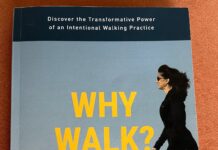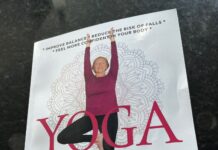by Nina Smiley
“Getting a good night’s sleep” is often our last goal of the day as lights go out. But when sleep is elusive, here are six things to try both before bed and even during a restless night:

#1 Prepare for Sleep:
While staying online until bedtime may feel like a way to be productive or catch up with the activities of family and friends, it’s not productive when it comes to falling asleep. Turning off screens at least an hour before bedtime can set the stage for relaxation and help you wind down.
#2 Write It Down:
Thinking about “tomorrow’s tasks” at bedtime may seem like a way to stay on top of what needs to get done, yet it also requires mental focus. Making a “To Do List” takes the pressure off remembering and puts the mind at ease which, of course, helps with getting that good night’s sleep.
#3 Sleep Rituals:
Developing your own night-time routine to let your body know it’s time for sleep can be an exploration of well-being. Try some relaxing stretches to signal that bedtime is coming. Sip a cup of caffeine-free tea. A warm bath an hour before bed may lead to drowsiness. Creating your own sleep ritual is an opportunity to remember how much self-care matters as you transition from the end of a busy day to a good night’s sleep.
| #4 Change Your Story: Learning to observe stories /self-talk instead of reacting to them, we can revise the way we frame the nighttime hours. Stories can lead to stress…and stress can lead to insomnia. So instead of “I didn’t sleep well last night or the night before. If I don’t sleep well tonight, I’ll be a wreck tomorrow,”changing your story to, “I’m getting a good night’s rest as I relax. I’ll be fine tomorrow!” invites calm to soothes a busy mind. #5 Breathwork: Mindfulness meditation is being present in the moment with thoughts and emotions in an open-minded, non-judgmental manner. Using the breath as the object of meditation, we learn to let the mind release worries as we calm the body. Taking full gentle breaths In and full gentle breaths OUT supports the relaxation response as the heart rate slows and the level of cortisol, the stress hormone, begins to lower. #6 Self-Care: Letting insomnia be your guide into an exploration of selfcare may bring a new way of supporting well-being into your life. Someday you may thank it! About the author Nina Smiley PH.D, Director of Mindfulness Programming at Mohonk Mountain House, graduated from Vassar College and earned a doctoral degree in psychology from Princeton University. She is co-author of The Three Minute Meditator (translated into 7 languages), Mindfulness in Nature, and MetaPhysical Fitness. Nina taught psychology at the University of Maryland and directed public relations at the American Psychological Association. She has studied mindfulness with Jack Kornfield (founder of Spirit Rock Meditation Center), Sharon Salzberg (co-founder of Insight Meditation Society), and others. She is also on the advisory board of the Breath-Body-Mind Foundation. |











